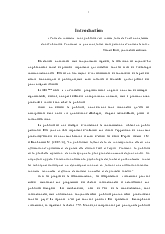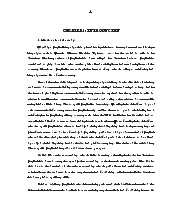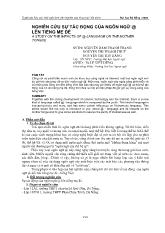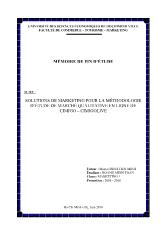The translation issues of chemical materials and the Application
- Người chia sẻ : vtlong
- Số trang : 40 trang
- Lượt xem : 17
- Lượt tải : 500
- Tất cả luận văn được sưu tầm từ nhiều nguồn, chúng tôi không chịu trách nhiệm bản quyền nếu bạn sử dụng vào mục đích thương mại
Bạn đang xem trước 20 trang tài liệu The translation issues of chemical materials and the Application, để xem tài liệu hoàn chỉnh bạn click vào nút DOWNLOAD LUẬN VĂN ở trên
1. Rationale
Nowadays, the world is confronted with challenges of socio-economic technology and scientific development. Everywhere people are talking about integration and cooperation to develop and deal with global issues. In such a context, the vital role of English, an international language is a big bridge to connect nations.
In the process of technology transfer, translating English texts into target languages or vice versa is indispensable. In Vietnam, chemistry section has been rapidly developed and expanded. In the support of chemistry development, there are some English and Vietnamese dictionaries of chemistry. However, the translation of English documents in this field is in great demand. Besides, translating materials in general and materials in chemistry in particular from English into Vietnamese or vice versa always creates difficulties because of the differences between the two languages.
In the process of translating chemical materials, I have realized that English noun phrases, which frequently occur in the texts, always cause difficulties for translators. The noun phrases are long, complicated and sometimes ambiguous in meaning. If translators do not understand the nature of noun phrase structures in both languages they can mistranslate or convey wrong meaning.
It goes without saying that there are many other things involved in the process of translation. In addition to semantic characteristics there exists the biggest differences of structural organization of noun phrases in English and Vietnamese. So it is necessary to point out the characteristics of English noun phrases and compare them with Vietnamese ones to help both researchers and translators.
That is why the study report aims at examining some of these areas. It is hoped that the report will be of some use to those who are responsible for translating texts in chemistry in Vietnam.
2. Aims of the study
The first question of the study is to identify and point out basic semantic and structural characteristics of English noun phrases in chemical materials.
The study is also aimed to analyse English chemical noun phrases in selected materials by comparing them with Vietnamese equivalents and provide suggestions for translation of materials in chemistry to achieve accurate, clear and natural translated versions.
3. Scope of the study
Two research questions in the preceding part have already implied that the research is focused solely on noun phrases in some selected materials rather than in the whole source language text and the translated versions in chemistry.
To be more specific the study will examine the differences and similarities between noun phrases in English and Vietnamese and their equivalents based on their semantic and structural characteristics. The sources of data are official documents with the source language texts and their translated versions from Department of Chemistry, Army Institute of Technology Assessment .
4. Methods of the study
The study uses collective, descriptive, and contrastive methods of language research. The particularization of English and Vietnamese noun phrases will be done by descriptive and contrastive methods. Equivalent noun phrases in two languages will be compared in terms of structural and semantic relations.
To accomplish this thesis, we will, firstly, go through a number of materials on translation and noun phrases to build up a theoretical background for the research.
The paper then will base on reviewing materials in the field of chemistry in order to collect noun phrases for description, analysis, comparison and induction.
I also have interviews and discussions with colleages and friends who are readers or translators in the field of chemistry to find out better information and suggestions for the study and the translation of chemistry noun phrases.




